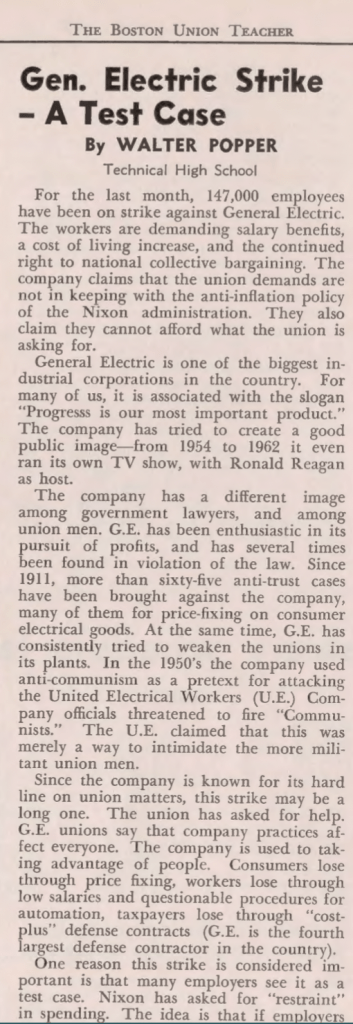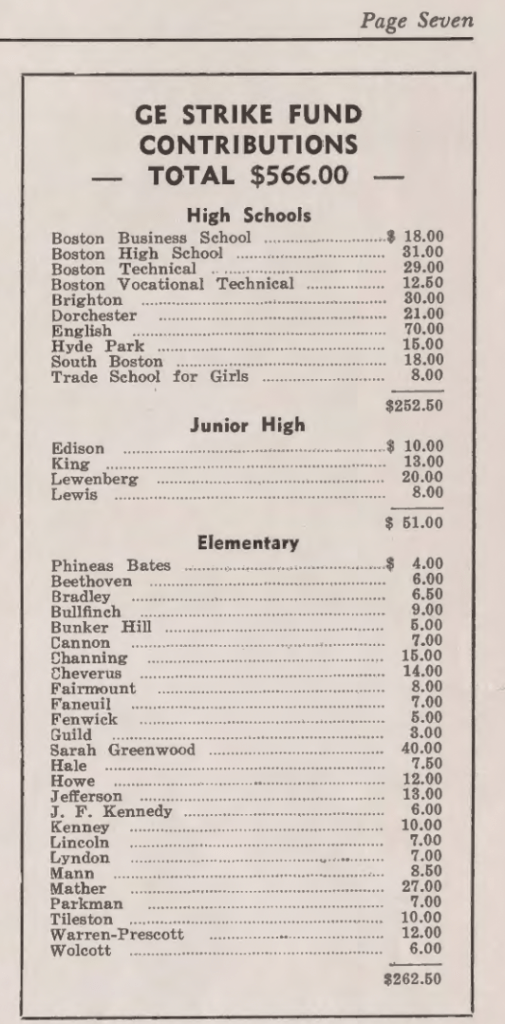The General Electric Strike of 1969-1970 was a national strike of nearly 150,000 workers, but it was also a local event, with workers at GE Aviation in Lynn, Massachusetts, taking to the streets. The GE workers had recently been on strike several years before and were advocating for better conditions and a raise. They stayed out on strike for 102 days, starting in November 1969 and continuing on into March 1970 when GE, despite some serious union busting efforts on their part, finally agreed to their demands.
The GE workers would not have been able to stay out on strike for so long if not for the added efforts of those that stood in solidarity with them. The BTU being one of them. Alongside publishing articles about the strike, the BTU raised money to send to the GE Strikers in March 1970, helping them hold on just a little longer.
Articles such as Gen. Electric Strike – A Test Case by Walter Popper, a teacher at Technical High School, outlines the issue quite effectively discussing why this strike matters and General Electric’s long history of fighting the Union.
The Company has a different image among government lawyers, and among union men. G.E. has been enthusiastic in its pursuit of profits, and has several times been found in violation of the law. Since 1911, more than sixty-five anti-trust cases have been brought against the company, many of them for price-fixing on consumer electrical goods. at the same time, G.E. has consistently tried to weaken the unions in its plants. In the 1950’s the company used anti-communism as a pretext for attacking the United Electrical Workers (U.E.) Company officials threatened to fire “Communists.” The U.E. claimed that this was merely a way to intimidate the more militant Union men.
This article was published in December, only a month into this 4 month long strike. It is only three months later in March 1970 that the BTU publishes the contributions that were made for the General Electric strikers.
Teachers from across the entire Boston Public School District raised $566 for the General Electric Strike workers in March 1970. This is a report after the donations had already been collected since the strike had ended earlier in March. Nevertheless this would have been a big contribution that allowed workers to continue fighting for their rights.
The GE Strikers win was significant, they won a 5o cent general increase in wages, restoration of Cost of Living Adjustments (capped at 8% per year), sick and personal days for hourly workers, a five week vacation, insurance improvements, and general contract language improvements.
This showed the power of the workers and the support that they had. This is the type of support that would allow the Boston Teacher Union to go on strike just a few years later.
Overall, the BTU was able to stand in solidarity with the General Electric Workers and support them in their endeavor for better wages, better conditions, and more. Something that the BTU would be standing up for in just a few years as well.
The GE Strike has a surprisingly thin historical coverage for a strike that kicks off the militancy within unions in the 1970s. The 1970s would become a groundbreaking decade of union activism, strikes, and labor actions that had an impact for decades to come. The IUE-CWA (Industrial Division/International Union of Electronic, Electrical, Salaried, Machine and Furniture Workers) Local 201 in Lynn, the union that represents most GE workers, recorded one of the best full histories of the strike in their fiftieth anniversary newsletter in 2019.

